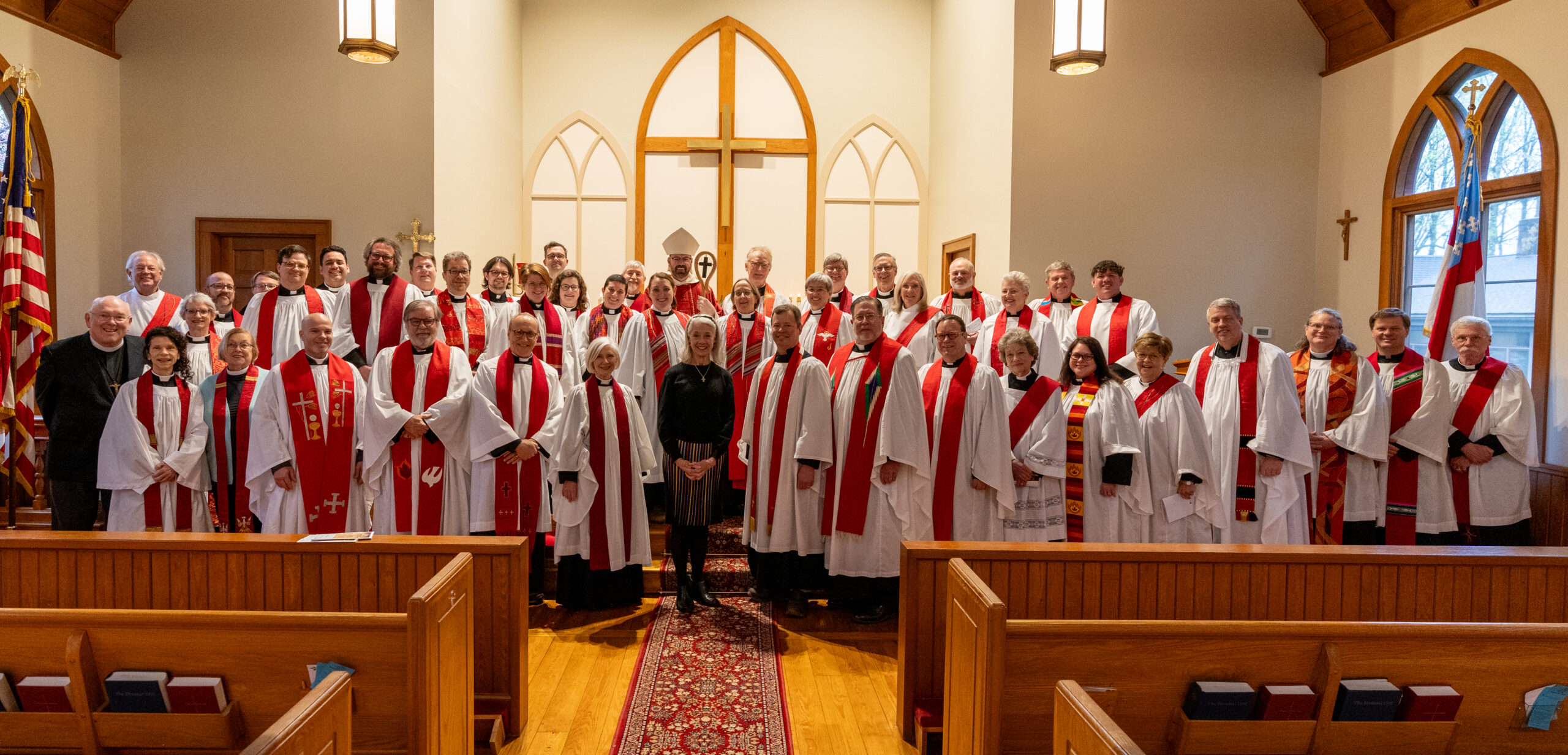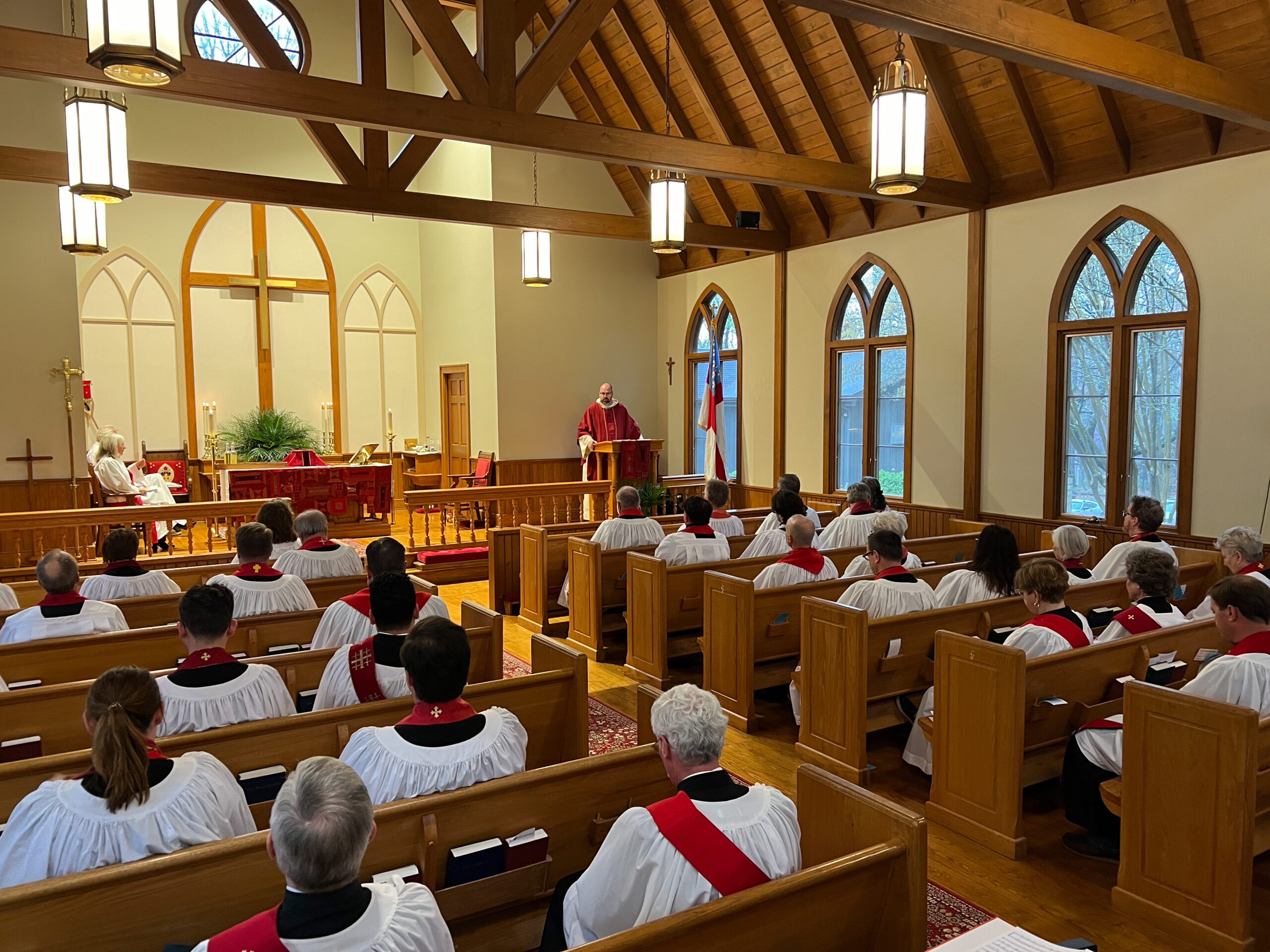
Bishop Brian Cole and the clergy of East Tennessee gathered at Church of the Resurrection, Loudon, to celebrate the annual Renewal of Vows and blessing of Chrism Oil. Kae Wrinkle, a member of the laity, was also present to ask questions on behalf of all East Tennesseans. Thank you to the people of Resurrection, Loudon, for hosting this year’s service. Below is a copy of Bishop Brian Cole’s sermon from that service.
 Renewal of Vows 2024
Renewal of Vows 2024
Church of the Resurrection, Loudon TN
The Right Rev. Brian L. Cole
As a way of preparing to reaffirm our ordination vows, I would invite you to keep a moment of silent prayer, recalling the holy silence that surrounded you in the moments before the Spirit of Wisdom made you a clergy person in this church.
(Silence).
This morning, we reaffirm, saying yes again, perhaps also saying thanks, that you and I live under vows as clergy in the Episcopal Church. We are reaffirming an act, an act that was both an end and a beginning.
To be honest, ordination is not really an end. The point is not to get ordained. The point is to answer a call from the Christ, a call affirmed by a community, that leads to ordination, but then hopefully leads to the larger life lived under vows.
While ordination is a beginning, that very first day that you begin to inhabit officially both the clothing and work of a clergy person, your ordination day is really a day of perfected focus. A Spirit-filled clarity descends upon you, when what had long been sensed, is now truly seen. Look, someone is being ordained.
Ordinations tend to be crowded events. You are there and family and friends. Clergy you have known forever join with clergy who are simply showing up for your ordination, not because they know you, but because showing up is what clergy do.
So, with a crowd, along with a cloud of witnesses, you are ordained. You take vows and the Spirit of Wisdom descends.
For the most part, however, we do not keep our vows in a crowd. So much of ordained ministry, even amid a busy parish, involves you alone, or you with only one or two others gathered. Only one of two are gathered, though you had hoped for a bigger crowd. Perhaps the 12-week early morning Bible study on Jude made more sense conceptually.
So much of our vocation as clergy becomes real when no one else is watching. We keep our vows when we rise early to pray. We keep our vows when sleep evades us, and the needs of the world press upon us at 3 in the morning. We keep our vows when standing by the hospice patient. We keep our vows by showing up daily, trusting that the Spirit of Wisdom which descended upon you at ordination continues to enliven and animate your call.
Today, in reaffirming our vows, we do so again in a crowd, a gathering of colleagues who are also saying yes. We say yes, with God’s help. We say yes, and we end up as witnesses to each other’s willingness to begin again, to gather with the crowd, to let the Spirit of Wisdom descend again and anoint us again.
From this day of reaffirmation, we will go back to the places where we keep our vows, with God’s help. From this crowd, we will go home, to the places where we show up. Even if we show up in those places and no one else is there, we trust that we are not alone. The Spirit of Wisdom is there. The God, who is our help, is there. The God, who is our help, is with us. So, we never keep our vows alone.
As Episcopal clergy, ours is a tradition in the Christian church deeply shaped by Benedictine spirituality. The sacred is grounded in the ordinary. The Spirit shows up, not only at the Eucharistic altar, but also at the soup kitchen. The God who is everywhere shows up in the daily, the here and now.
One of the vows taken by a Benedictine monk is the vow of stability. It is a vow to stay put, to remain faithful to a community. It is a mutual promise that the monk will shape the community where they are situated, and the community will shape the monk.
This morning, I am not addressing monks. Over the course of our vocations, most of us will serve in numerous places, going from here to there, from diocese to diocese.
So, if we are not situated forever in one physical place, is there another way to practice stability?
I would like to suggest there is a way for us to keep a vow of stability as clergy. I do so because I also believe it will keep our vocations alive and flourishing.
Remember, your vows, like your whole life, is hidden in Christ. And Christ Jesus, who holds all things together, is in you. This week, we hear Jesus asking for his three closest disciples to stay close with him while he prays. In keeping your vows, ask Jesus to stay with you while you pray or try to pray on your hardest days.
In Christ, we confess a belief that we can do this work because we have been equipped by Christ. We do not keep our vows apart from being centered in Christ. The One who is the source, the One who we encounter in the Spirit of Wisdom, is the One able to remain a stable place for us, even as we move from place to place over a lifetime of ordained ministry.
Along with renewing our vows today, saying yes again to a call to serve Christ in the Church, we leave here with oils for baptism and healing.
The Chrism oil reminds us that we are called to evangelize, to welcome all into the life of faith, to mark with oil all who have who been washed in the waters of baptism. You and I are called to make disciples, to guide others in growing up in the faith.
The oil for anointing the sick reminds us that you and I are also called to proclaim Christ the Healer, the one who comforts us in affliction, who is most present in the pain of the world.
On this day of renewal, we are here on an early Spring rainy day. Apart from the rain, however, the world is on fire. War in Ukraine, Gaza. The country of Haiti is in chaos. Our democracy here is imperiled. More and more suggested legislation in our land appears to be only intended to hurt the least of these in our midst. You do not need to know it is Holy Week to understand we are walking towards Golgotha again.
So, it is particularly poignant to say yes when it would be so easy to say we do not know the Rejected One. It would make sense to deny the One who promises us abundant life, but not before calling us to die, to lose our lives.
I said to you earlier that I know I am not addressing monks this morning. But I also recall that Thomas Merton, when reflecting on his vocation as a monk, thought of the monastic as a marginal person. For him, monks lived on the edge, looking quite ridiculous to the world where dominating power and self-promotion are held up and honored, where the seven deadly sins are reimagined as life hacks for getting ahead.
So, while we are not monks, perhaps it is wise for us to realize how ridiculous any of us look who claim to follow the way of Jesus now. For any of us who claim to trust the Spirit of Wisdom to lead us to a deeper wholeness, we should not be surprised to appear as marginal people, fools for Christ.
Many of our colleagues who cannot be here this morning have contacted me this past week and told me they would be setting aside some time today to read over their vows again, to pray through them and say yes again. So, while we are here, gathered in a crowd of colleagues, remember those of us who are away from here, saying yes while seemingly by themselves. But with God’s help, they are not alone.
With God’s help, you and I say yes again. With renewed hearts, with oils for evangelism and healing, with the clarity that we have said yes in following the Rejected One, remember these are vows worth keeping.
